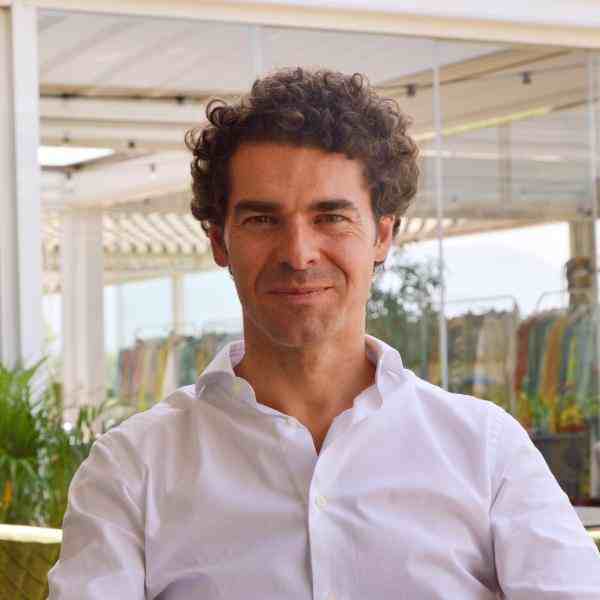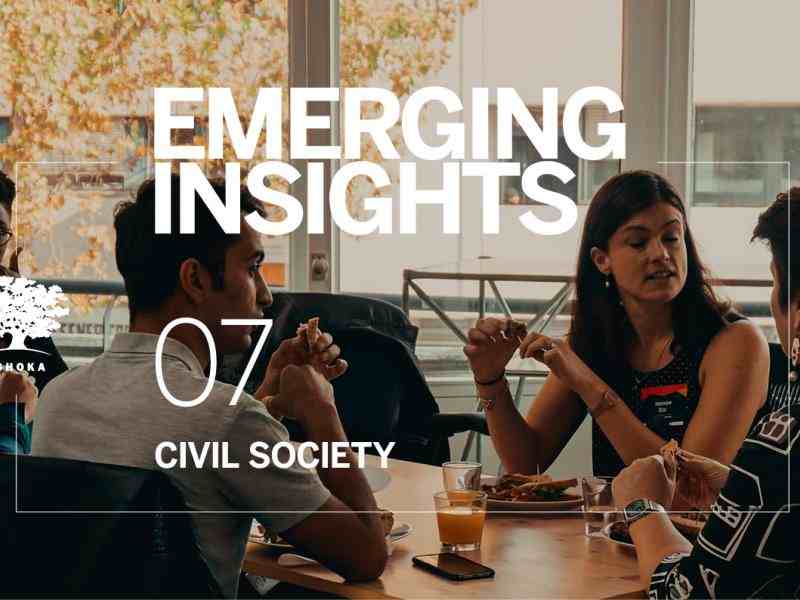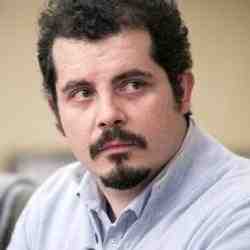Introduction
Alberto Alemanno is empowering citizens to turn away from passively consuming to actively shaping public policy. Through The Good Lobby, he enables people to become citizen lobbyists, by equipping them with key civic and legal skills through a citizen lobbying toolbox, by providing inspiration from real cases of citizen-led initiatives and by matching them with expert volunteers to support the lobbying needs of civil society organisations.
The New Idea
As voter turnout rates decline and populism and nationalism are on the rise, the gap between decision makers and citizens is widening. A lawyer by training and with a social democratic family background engaged in opposing corporate elites, Alberto realised that citizens and civil society can influence policy making processes, by using the power of lobbying to close this gap.
Alberto created The Good Lobby, based in Brussels, an organisation that empowers citizens to become citizen lobbyists, by building capacities on how to actively participate in influencing the decision-making processes of EU and national policy makers. For this, they diffuse their 10-step citizen lobbying guide, a toolbox that serves as a self-learning tool to understand how to efficiently lobby for one’s purpose, through workshops across Europe and beyond (e.g. Japan, Brazil). Additionally, The Good Lobby is matching civil society organisations that have lobbying needs with expert volunteers, that are teams of training alumni and thematic experts who want to share their (e.g. lobbying, law or campaigning) expertise with civil sector organisations and citizen-led initiatives. Lastly, The Good Lobby is highlighting the success stories of citizen-led initiatives that have achieved policy change, creating a positive narrative about citizen lobbying, sensitising the broader public to see lobbying as a regular, successful civil duty.
Whilst similar intermediary organisations work on connecting expert law firms’ pro bono expertise with civil society organisations, Alberto is taking an approach focused on empowering citizens. He is following his conviction that everyone has an expertise and can contribute to making profound policy changes by sharing one’s unique skillsets and experiences. Through the support of citizen lobbyists, civil society actors are enabled to overcome their chronical resource shortage and can turn their knowledge into proper lobbying activities that are on the same qualitative level as their corporate counterparts, that dominate the lobbying sector.
Therefore, The Good lobby is enabling lobbying activities, for up to about 60 civil society organisations per year. The outcomes of these matches range from having better data on policy subjects, policy briefs and draft directives, to around 6 lighthouse cases per year that have a significant policy impact on a European level, proving that participatory democracy can improve the lives of millions of citizens.
The Good Lobby’s success inspired citizens and organizations across the continent to rethink their own role and methods in participatory citizenship. As a result, a local organization in Italy is already launching a The Good Lobby chapter in the country and others are being discussed across the European Union. In Alberto’s vision, lobbying should go mainstream and should just another hobby like playing football or going to the park with friends. Equally, it is something that should become institutionalised and part of the democratic process, by deeply being ingrained in the democratic bodies of the EU.
Expert volunteers share their skills with NGOs working on the most important social and political issues in Europe. These expert volunteers include some of Europe’s leading academics, lawyers, business professionals and its brightest students. The Good Lobby connects NGOs and civil society groups with the expertise they need. Through lobbying, advocacy, and policy research The Good Lobby promotes democratic, transparent and accountable EU institutions.
The Problem
75% of policy making meetings include shareholders and corporate elites but fail to represent the wider population. In parallel, civil society lacks resources and knowledge, to create powerful lobbying campaigns, leaving their potential untapped. While many citizens associate lobbying with a "dirty activity" reserved to professionals with incredible influence and economic power, Alberto found that lobbying can become a key strategy for citizens to enter the policy making process.
Within the EU, the channels for citizens to become involved in the policy making processes are hardly known and used. 63% of EU citizens have little or no knowledge of their EU law rights. An example is the European Citizen’s Initiative: If these receive more than 1 million signatures, they have to be considered by the European Commission Since its conception in 2011, just 60 ECI have been initiated. For all the 60 ECIs only 9 million signatures where received in total.
To this limitation of being able to participate from a citizen’s perspective, also comes the general effect, that politicians, as soon as they are elected members of parliament, are predominantly surrounded by peers, expert bureaucrats and corporate lobbyists, and lose touch with citizens. This leads to a reduced capacity of empathy of citizen’s needs. Leading to a constant feeling of not having a voice in European policy making has been existing amongst European citizens: In 2018 only 49% of the European population believed that their voice counted in the EU.
As a result, people become detached from the world of policy, which is reinforced by the fact that most people are only made aware of two options on how to participate in the policy making process: Either through voting, which appears to be less and less valued (voter turnout decreasing), or by running for office, which brings opportunity costs too high for most citizens to pay. Citizens are, therefore, often only limited to react to what is presented to them by the policy makers - they become passive consumers of policy. Discontent with policy makers' decisions and unaware of other options, more and more citizens form protest groups, while governments then make reactive policies, which do not change the systemic issue, that citizens are not heard in real time, but just reinforce the reactive logic, that protests create reactions on the policy side. Many examples like this exist across the EU’s member countries: The “gilets jaunes” (“yellow vest”) movement in France, the climate change walks all over Europe, the rise of populist and nationalist parties across the world.
Lastly, most solutions that work on empowering civil society like change.org or avaaz.org, enable citizens to bring topics on the broader agenda but fall short of facilitating the right activities afterwards in the field to bring upon change. Additionally, common pro-bono clearinghouses do not focus on the education of citizens, to become change agents nor do they focus their activities on the most impactful cases that civil society in urgent need. Their role falls oftentimes short to just providing legal services, that are of short-term importance for the civil society actors themselves but lack a systemic approach.
The Strategy
Central to Alberto’s vision of a behaviour change where “citizen lobbying is just another hobby that contributes to more accountable and participatory societies”, is a carefully crafted strategy: building international citizen lobbyist communities and creating opportunities to share and acquire skills among citizens with the objective to change policies and raise the visibility of citizen lobbying as a viable alternative to voting or running for office.
Education, Data collection & Network Building
In order to build up a network of citizen lobbyists and expert volunteers, The Good Lobby holds, workshops across and beyond Europe. In collaboration with local partners, they diffuse the content of the citizen lobbying toolbox. This is a 10-step guide, that enables citizens to have the capacity to go through the legal, strategic, administrative and communicative aspects of the lobbying process. The approach focuses to foster a mindset of maximising impact, by contextualising personal lobbying needs to find systemic, wider reaching solutions. Already 1100 European citizens have taken part since 2017. Alumni of the trainings become members of the citizen lobbying network. Additionally, on average each workshop generates around 5-6 citizen projects consisting of citizen-driven lobbying projects as well as, more broadly, impact journalism projects and mobilization campaigns for example.
Adding to this network is the annual summer academy, a multi-stakeholder forum where Alberto convenes academics, corporate lobbyists, NGO leaders, policy makers, philanthropists and students in a one-week lobbying academy to cross borders and discuss how to collaborate and transfer the knowledge of the different worlds to one another. Here another network of about 350 professional experts has been created, that is necessary for the matchmaking activities of The Good Lobby.
Lastly, together with regional partners, The Good Lobby is also systematically surveying the regional needs of civil society actors in European countries to create a database and an assessment, what kind of advocacy needs exist and where, in order to filter trends and have the right expertise in the network to meet the needs.
Matchmaking
Using the mapping and the volunteer network’s lobbying expertise, The Good Lobby equips civil society actors with the same resources as their corporate counterparts by selecting experts from its volunteer pool to create the right capacities to lobby within the institutions.
Civil society actors can approach The Good Lobby with a request where they need support to develop their advocacy ambition adequately, or where they need the knowhow of citizen lobbyists on how to approach a lobbying campaign. The Good Lobby then forms teams of citizen lobbyists from their network that are the most apt for the need. Additionally, given their data collection activities and Alberto’s connections to the world of academia, The Good Lobby can approach civil society organisations with knowledge and data to empower them to start a lobbying process. Therefore, democratising and demystifying the lobbying process and closing the gap existing between the several actors.
Since 2016, The Good Lobby successfully, incubates and completes about 60 legal and advocacy projects through TGL’s matchmaking mechanism per year. Some examples of these include: Engineered by The Good Lobby, Transparency International was able to bring a whistle-blower draft directive to the European Commission, that now serves as the EU’s first legal directive on whistleblowing protection and is now being developed to become a global standard. Thanks to The Good Lobby, EU citizens will have access to the election process of the Judges of the European Court of Justice, that was previously non-transparent. In Belgium they have opened the case on unpaid internships within the European Parliament by enabling the European Youth Forum to submit a complaint. This has led to the European Parliament to ban all unpaid internships in their institutions, making them accessible to economically less privileged, but talented youth.
Celebrating & creating visible narratives around successful citizen-led activism
In order to mainstream the idea of citizen lobbying, The Good Lobby has created a multitude of activities to bring visibility to the power of citizen lobbying in influencing policy making processes and to showcase new channels of democratic participation.
The Citizen Lobbying Awards that take place every year in Brussels celebrate successful citizen-led lobbying efforts. The simple message here is: “Lobbying works” - also for civic purposes. The ceremony serves as a platform for citizen lobbyists to come together to celebrate and learn from each other, which has scouted emerging leaders such as Greta Thunberg well before she gained world’s attention.
Additionally, The Good Lobby’s storytelling is central through the crafting of a positive narrative showcasing the impactful citizen-driven social change, through both an editorial and media omnipresence. The Good Lobby and Alberto, have an editorial column in The Guardian and also have been featured in many leading, (inter)national newspapers and TV channels (e.g. The New York Times, The Financial Times and TV channels, such as Al-Jazeera, BBC World, ARTE).
Scaling
Leveraging on the success of the current strategy, drawing from the positive outcome of their scaling to Italy, as well as the momentum of the rise in citizen movements, The Good Lobby is developing a locally adapted replication model to transfer their impact. Using their existing network of partner organisations that independently proliferate and diffuse The Good Lobby’s vision and activities, they are developing a social franchise model adapted to the diverse local contexts. This will help to institutionalise national lobbying hubs that can empower even more citizens and create more channels to engage in the democratic decision-making processes.
The Person
Giving a systemic interpretation to his grandmother’s advice, “if you want to save lives you should become a doctor”, by answering, “no I should change the law”, Alberto, who was brought up in the industrial areas of Torino, characterised, by labour disputes. ( in which his immediate environment and parents were actively engaged in), was driven to study law and explore how risks can be mitigated through regulatory practices.
When diving deeper in the material of risk regulation, as a PhD student, he quickly realised a systemic disconnect, through non-communication, existing between academia, civil society and the private sector. He felt this reality to be very odd, as often academics, activists, policy makers, lawyers and other professionals were working on the same issues and could have benefitted from another’s knowledge and data.
Consequently, he created a multi-stakeholder platform (a Summer Academy), where every year for one week, professional corporate lobbyists, NGO leaders, academics, students, professionals and philanthropies come together to discuss topics related to participatory democracy and new power structures, learn from another and bridge gaps of understanding to build coalitions and share expertise, to consequently reduce silo-thinking.
To create something that could reach a broader audience outside of the academic circles and the academy’s participants, Alberto decided to create a journal on the topic of risk regulation, that remains highly popular (more than 9,000 subscribers) as it is read and referenced by many different stakeholders, from UN-agencies and academics to established magazines like the Economist, Nature or Science magazine. Alberto successfully sold the journal to Cambridge University Press, the oldest and one of the most influential publishers of expert journals with a high margin.
However, he realised that hosting conferences and publishing journals was not enough to empower many people to go beyond their job descriptions and become actively engaged in regulation risks (lobbyists). Therefore, he launched with the support of its own university – leading business school HEC Paris – as well as New York University (NYU), the first law clinic focusing on advocacy with the declared aim to train the first generation of European citizen lobbyists. In this lab (today at its 7th edition), students work on real life cases, brought forward by some major and smaller NGOs to support their needs regarding drafting legal strategies, papers that they could be used to actively lobby.
In this space, Alberto experimented and validated his hypothesis that civil society can be tremendously empowered, if advocacy skills are more widely shared to citizens and experts and resources to lobby are more equally distributed between the private and civil sector. One the major successes of the Lab was the abolishment of roaming fees that EU citizens had to pay when calling home from abroad.
After prototyping it, Alberto made the next step and created The Good Lobby to systematically spread the message that citizen lobbying works!
Today, Alberto is a well-established public figure across sectors and disciplines with a distinguished and unusual public interest vocation that transcends the national boundaries across Europe. He sits on the board of - and strenuously supports – several leading organisations all active on transnational initiatives committed to ensure a better participation of citizens and civil society. Amongst others he and The Good Lobby are highly active in Ashoka’s Hello Europe Initiative by supporting the scaling Fellows and Social Entrepreneurs with advocacy tools and legal advice. Furthermore, Alberto was nominated European Young Leader 40 under 40 in 2013 and Young Global Leader in 2015 by the World Economic Forum.
Alberto is a true European, Italian by birth, teaching in Paris and founded The Good Lobby in Brussels. His capacity of transcending borders is reflected in his multi-stakeholder and transdisciplinary approach and the work of The Good Lobby across the European continent. Alberto’s work is contributing to the creation of an emerging European civil space beyond the limited scope of nation state, embracing the borderless nature of the many advocacy challenges that civil society is currently facing.

 Tile image
Tile image


